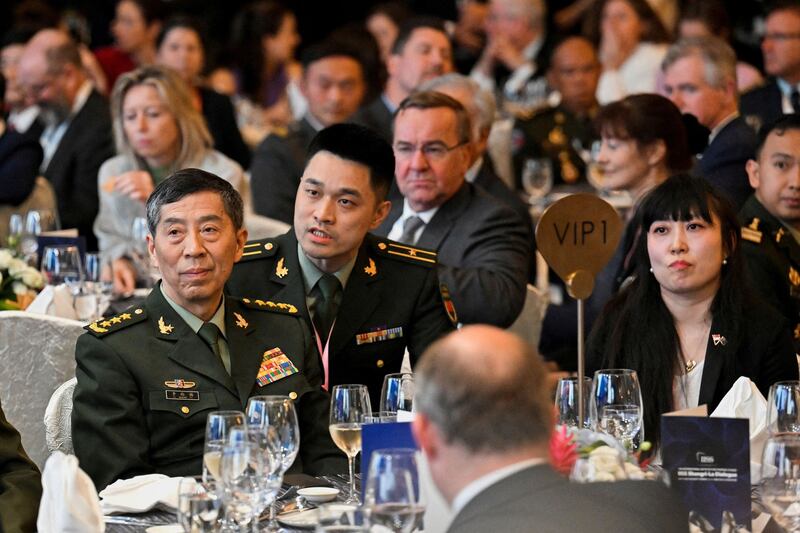Chinese Defense Minister Li Shangfu is reportedly being investigated by the ruling Chinese Communist Party after being out of the public eye since Aug. 29, according to several Western media reports.
Li is the second senior Chinese official to go missing after the recent disappearance of former Foreign Minister Qin Gang.
Reuters quoted "10 people familiar with the matter" as saying that Li is being probed for corrupt procurement of military equipment, without specifying the kind of equipment involved.
"Eight senior officials from the Chinese military's procurement unit, which Li led from 2017 to 2022, are also under investigation," the agency said in a report on Friday, citing two people in direct contact with the military.
The Washington Post quoted U.S. officials as saying that Li, who was last seen in public at the China-Africa Peace and Security Forum in Beijing on Aug. 29, is currently under investigation for "corruption," and will likely be removed from his post.
An official account of Li's last public speech from state news agency Xinhua was still available on the website of the State Council on Friday.
The Wall Street Journal also reported that Li will lose his job, while the Financial Times reported that the U.S. government believes him to be under investigation.
Li, 65, has missed meetings with Vietnamese and Singaporean defense leaders in recent weeks, Reuters said in an earlier report quoting sources with direct knowledge of the engagements.
Another disappearance
The reports came after Rahm Emanuel, the U.S. ambassador to Japan, tweeted that Li was also "a no-show" for his planned trip to Vietnam, drawing parallels with Qin Gang’s disappearance.
"President Xi’s cabinet lineup is now resembling Agatha Christie’s novel ‘And Then There Were None,’” Emanuel wrote. "First, Foreign Minister Qin Gang goes missing, then the Rocket Force commanders go missing, and now Defense Minister Li Shangfu hasn’t been seen in public for two weeks. Who’s going to win this unemployment race? China’s youth or Xi’s cabinet?”
Beijing has remained tight-lipped about the whereabouts of Qin, who was replaced as foreign minister by top Communist Party diplomat Wang Yi on July 25.
By July 31, President Xi Jinping had also replaced the commander of the country's rocket corps -- which controls the country's nuclear missiles -- amid media reports of an investigation into his predecessor and his deputies.

U.S.-based former PLA Navy Lt. Col. Yao Cheng said that move was part of Xi's bid to remove any dissenting voices from the highest echelons of military command as part of preparations for a military invasion of democratic Taiwan.
"It's been the Rocket Force people who don't want to go along with Xi Jinping's plan," Yao told Radio Free Asia at the time. "They don't want a war -- they fear war because they have a very clear idea of what their missile capabilities are."
1982 army enlistment
Li joined the Communist Party in 1980 and enlisted in the army in 1982, serving as director of the Equipment Development Department of the Central Military Commission and other important positions in procurement.
By 2022, he had a seat on the party's 20th Central Committee, and was appointed defense minister in March 2023.
Li was sanctioned by the U.S. State Department in September 2018 due to transactions with Russian arms dealers.
Chinese foreign ministry spokeswoman Mao Ning declined to comment on Li Shangfu's whereabouts when asked about him during a regular news briefing on Monday.
"I'm not aware of the relevant information," she told reporters.
The defense ministry didn't immediately respond to requests for comment from Reuters, while the U.S. Embassy in Tokyo said it had no further comment for the time being, the agency reported.
‘Invisible’ factors
Political commentator Johnny Lau said that arrests of senior officials in China for "corruption" can be highly selective, and have little to do with how corrupt any of them are.
"We have seen in the past that there were a number of factors that were invisible ... in the Chinese Communist Party's ongoing anti-corruption campaign," Lau said. "In other words, he has chosen [whom to target], and these aren't genuine anti-corruption cases."
"They don't involve the state legal system until they have figured out the impact on the party [of targeting this person], using its disciplinary system," he said.
"This way of going about it feels a lot like rule by a single individual."
But Lau said Beijing is unlikely to put on a big show trial, as it did in the case of former Chongqing party chief Bo Xilai and his political associates.
"A lot of these things are dependent on various factors, like internal reshuffles, power struggles and internal shock-dampening," he said.
But Lau saw the recent changes at the head of the Rocket Force as likely to lead to less military tension, rather than more.
China this week unveiled a "blueprint" for "peaceful unification" including economic incentives and sweeteners for residents of Taiwan, which has never been ruled by Beijing, to move to China's Fujian province to live and work.
Translated by Luisetta Mudie. Edited by Malcolm Foster.
